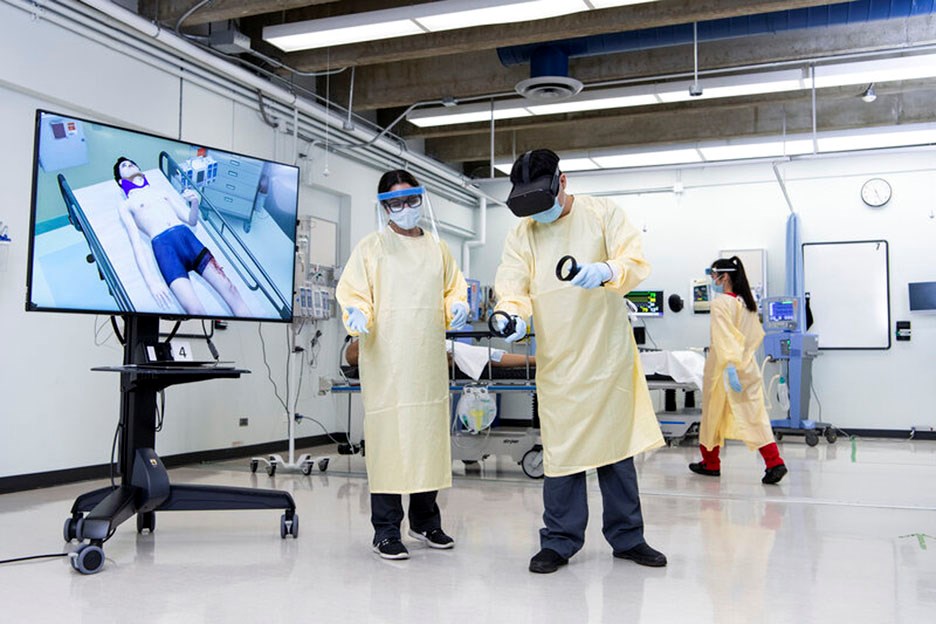This year’s National Nursing Week — May 10 to 16 — recognizes the important role of nurses in a patient’s healthcare journey, as well as their extraordinary response to the COVID-19 pandemic.
The pandemic brought to light the courage and commitment of nurses. As reflected in the 2021 theme #WeAnswerTheCall, this year’s National Nursing Week is an occasion to honour nurses and their dedication, resilience, and compassion in caring for the community.
This sort of acknowledgement and support is important, says Shelley Fraser, Associate Dean of Nursing at Burnaby’s British Columbia Institute of Technology (BCIT) — and it reminds nurses they’re part of a global community.
“In their first year at BCIT, when students meet each other, we tell them how it’s important for them to look around at their peers and recognize the value of these relationships,” says Fraser. “I emphasize, ‘the people you are meeting are going to be your support system, and friends and team.’ We all have each other’s backs.”
What it means to #AnswerTheCall
“There’s a philosophy in nursing that is especially relevant right now. It’s the idea that, you don’t sit down if no one else is sitting down,” says Kathy Kennedy, Associate Dean of Specialty Nursing at BCIT. “Basically it means, as nurses, we just keep going and going, and pitching in until things are done. We support each other.”
This type of courage and commitment to service is key in a profession that deals with life and death situations, but it comes with a physical and emotional toll.
As hospital intensive care unit (ICU’s) wards fill up, and the COVID-19 pandemic continues, nurses are more and more stretched to the limit.
“Nursing is already a difficult job,” notes Kennedy. “This year it’s been unrelenting.”
Over the past year, she notes, nurses have come out of retirement, her fellow nursing faculty at BCIT has juggled educating students with working on the frontlines providing healthcare — and through everything, they’ve rallied.
“Our role is to get as many frontline health care workers out there as we possibly can, and ensure they’re well-prepared,” says Kennedy.
At the start of the pandemic last year, she and the Specialty Nursing faculty came together to create Focused Education Preparation Advancing Frontline Registered Nurses (FEPA) — a fast-tracked, educational course specifically designed to upskill people on the frontlines so they could better serve patients with COVID-19.
Since then, over 12,000 nurses and healthcare providers in Canada and the United States have taken the course to provide some tools when working in a team based approach to care for, higher acuity or critical care patients requiring, advanced monitoring including mechanical ventilation due to their illness.
A growing demand for nurses
There are also many work opportunities for nurses outside of traditional hospital settings, notes Fraser.
“What people don’t realize, there’s such a diversity of places where you can work as a nurse,” says Fraser. “People can move into many different fields — from working in public health to supporting vulnerable and disenfranchised communities in the Downtown Eastside.”
She predicts nurses are going to be more and more central to BC’s healthcare system and have access to more diverse employment opportunities.
“For instance, BC is moving towards a primary care model — providing team-based healthcare closer to home,” says Fraser. “And I see nurses taking a key role working collaboratively with physicians, and also, as nurse practitioners, a really holistic model of care.”
Education helps ensure peace of mind
A hands-on education — like the one offered at BCIT through the applied learning model, including clinical experience — ensures peace of mind and confidence for graduates since they complete their education armed with real-world skills.
Since hospital clinical placements continued throughout the pandemic, instructors worked to provide extra support for students, as well as online courses for caring for ventilated patients, and virtual simulations, and updated modules to include information on personal protective equipment and safety.
“As an educator, I know it’s key to provide students with the very best education and clinical experience possible to ensure they’re prepared for what’s ahead — and supported along the way,” says Shelley.
“When you know what to expect, and you’re prepared, it makes a difference.”
At BCIT, students enrolled in the Bachelor of Science in Nursing (BSN) curriculum take advantage of a spiraled, competency-based model that employs conceptual learning and technologies, as well as active learning strategies, including simulated and clinical practice experiences.
For instance, students get to work on life-sized Human Patient Simulators. They have hearts that beat, lungs that breathe and they even bleed, cry, and talk.
Student mentors and dedicated staff are on hand to help students feel even more supported.
Caring for those around you
Healthcare professionals are at the heart of our communities—improving the quality of life for all and providing care for our most vulnerable. Visit Canadian Nurses Association to access resources to help celebrate National Nursing Week or learn more about BCIT programs to support a career in healthcare, including nursing.
- This article was contributed by BCIT




